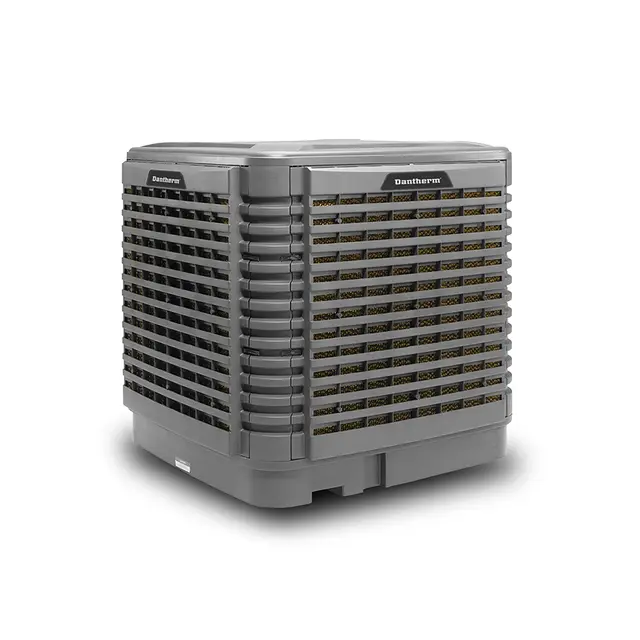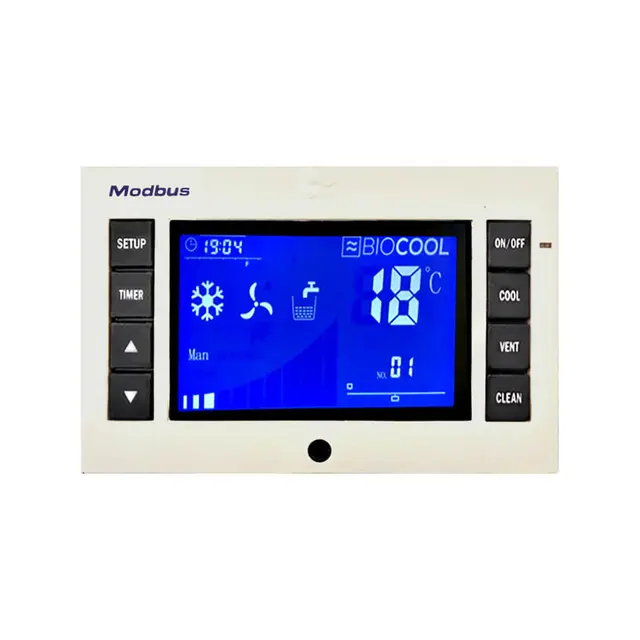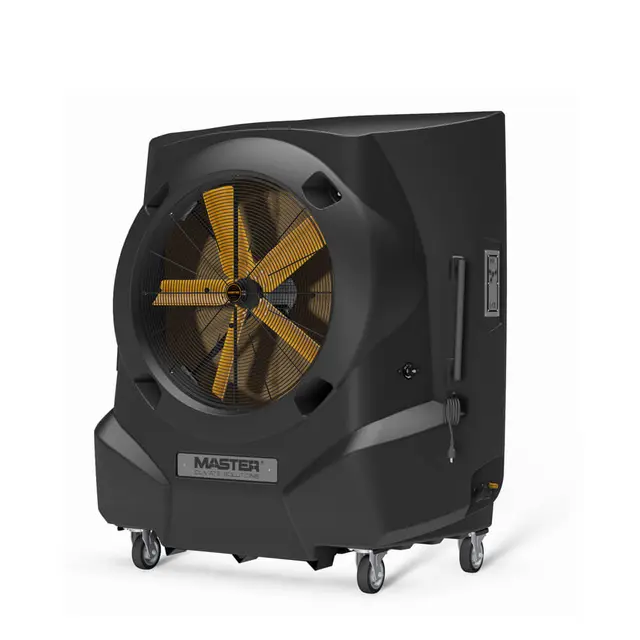How effective are evaporative coolers?

- Home
- Insights
- Cooling insights
- How effective are evaporative coolers?
Discover how evaporative coolers are ideally suited to regulating indoor conditions, and the unique advantages this technology offers over alternative solutions.
No matter if you’re a shop, an office or a warehouse, it’s so important to keep your patrons and employees at a comfortable temperature to ensure they remain happy, safe and productive throughout the day.
While air-con has traditionally been the go-to solution, evaporative coolers are an efficient, cost-effective alternative that organisations and businesses are beginning to seek out and adopt.
What are evaporative coolers?
Evaporative coolers, sometimes referred to as swamp coolers, are devices that harness the natural process of evaporation to cool spaces efficiently and cost-effectively. To do this, units draw in warm air, forcing it through several damp membranes, absorbing heat and emitting cooler air in the process.
To illustrate the real-world impact this technology can have on your indoor climate, evaporative coolers can cause a temperature drop of between 4°C and 12°C when outdoor temperatures are between 20ºC to 25ºC.
Do evaporative coolers work as well as air-conditioning systems?
Although conventional air-conditioning remains a popular choice for homes and businesses, people are now recognising the limitations of this technology, and that there are more effective alternatives on the market.
As a result, a growing number of businesses are now turning to evaporative coolers to keep their spaces at the optimum temperature and saturated with clean, fresh air. The advantages do not stop there – when compared with mechanical A/C, evaporative coolers offer a number of distinct benefits:
Increased energy efficiency
Evaporative cooling units are considerably more energy-efficient than traditional air-conditioners because this technology uses the power of mother nature to cool the air and renew the atmosphere inside.
For organisations that want to mitigate their impact on the environment, evaporative coolers typically use just 10% of the electricity that a mechanical A/C unit requires. This makes this technology incredibly useful for organisations seeking to be more sustainable and meet increasingly strict environmental regulations.
Low running costs
As energy consumption falls, so too does your organisation’s energy bill. This technology can significantly reduce the amount of money you spend on cooling by up to 80%.
Slashing your overheads doesn’t just bolster your company’s bottom line – it also makes cooling large spaces, such as factory floors or supermarkets, economically viable when compared with more costly air-conditioning systems.
Renewed air quality indoors
Traditional air-con works by capturing hot air in the room and cooling it using a chemical refrigerant. While this does provide effective cooling, it does not renew indoor air quality, allowing pollutants, odours and virus particles to build up.
A fixed evaporative cooler, on the other hand, removes stale air and replaces it with fresh air from outdoors. This 100% fresh air circulation rids the atmosphere of unhealthy particles, aiding worker concentration, employee safety and team productivity.
As an added benefit, these commercial coolers can help regulate moisture levels. This both prevents high humidity and sticky conditions from creating an uncomfortable environment for customers and staff, as well as health issues that can develop when air is too dry.
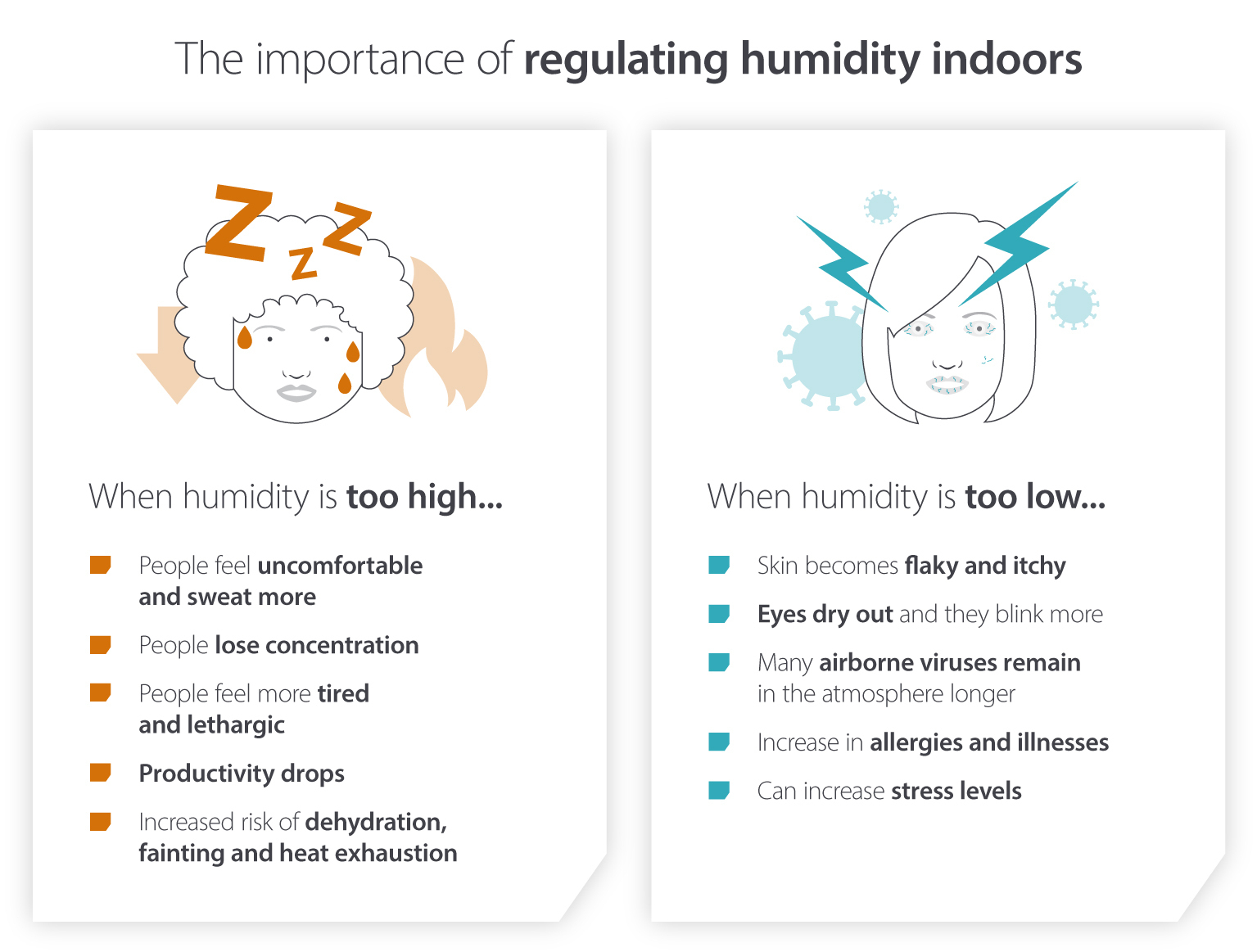
Simple installation and maintenance
As evaporative coolers work by harnessing the natural power of water evaporation, this technology is simple in construction, limiting the chances that components can break down.
This simplicity also aids installation, making it much faster to install than conventional air-conditioning units.
Reduced impact on the environment
Because air-con units rely on electricity and special gases to perform their task, these units have a significant impact on the environment. It’s estimated that the 1 billion+ conventional A/C units in use today produce roughly 2 billion tonnes of CO2 a year while also leaking harmful planet-warming gases into the atmosphere.
In comparison, evaporative commercial coolers are very environmentally friendly, generating water vapour as the only byproduct of its process.
Are evaporative coolers better than fans?
While evaporative cooling offers a series of distinct advantages over traditional air-con units, how does this technology stack up against electric fans or ceiling fans?
Fans lower body temperature by blowing air over the skin, evaporating the moisture on top. While both swamp and fan cooling harness the same natural process of evaporation, the outcome of each technology is different. Fans cool people, evaporative units cool the air.
Because a fan’s effectiveness entirely depends on physical contact, environments where people wear head-to-toe PPE would not feel the effects of fan cooling technology. Additionally, fans are noisy – especially at scale – and could serve as a major distraction for employees in the workplace.
In comparison, evaporative coolers are incredibly quiet and have a direct effect on the temperature of the space. As a result, these units are suitable for a wider variety of applications.
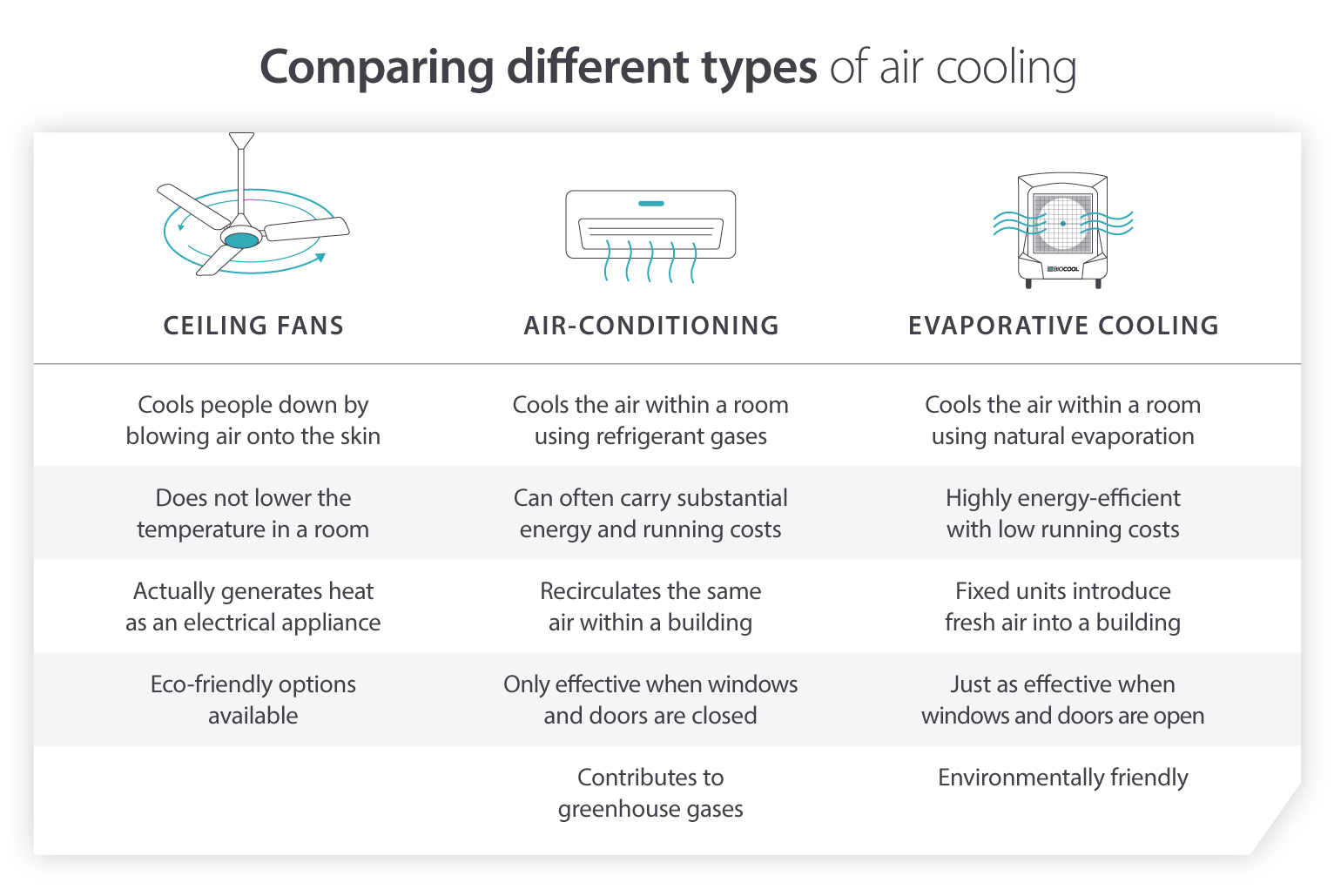
Where can you use evaporative coolers?
Although evaporative coolers may not be suited to servicing precision environments, the many advantages of this technology lend itself to several different applications, such as:
Retail centres and shops
To ensure your customers stick around for as long as possible and visit again, it is important that they feel comfortable in your shop. To regulate air quality, humidity and temperature, evaporative coolers are an efficient multi-purpose solution. Plus, as these units are just as effective when doors and windows are open, this is beneficial in retail centres where footfall is high and doors are opening and shutting frequently.
Vehicle dealerships
Vehicle dealerships will often have a showroom and conjoined workshop under the same roof. To ensure the heat and fumes from the garage don’t interfere with the customer experience, evaporative coolers are the optimal solution.
Factories
Factories, such as steel treatment plants, can be vast structures full of unpleasant odours and heat. You can boost workplace safety and employee satisfaction by venting noxious fumes and cooling the space.
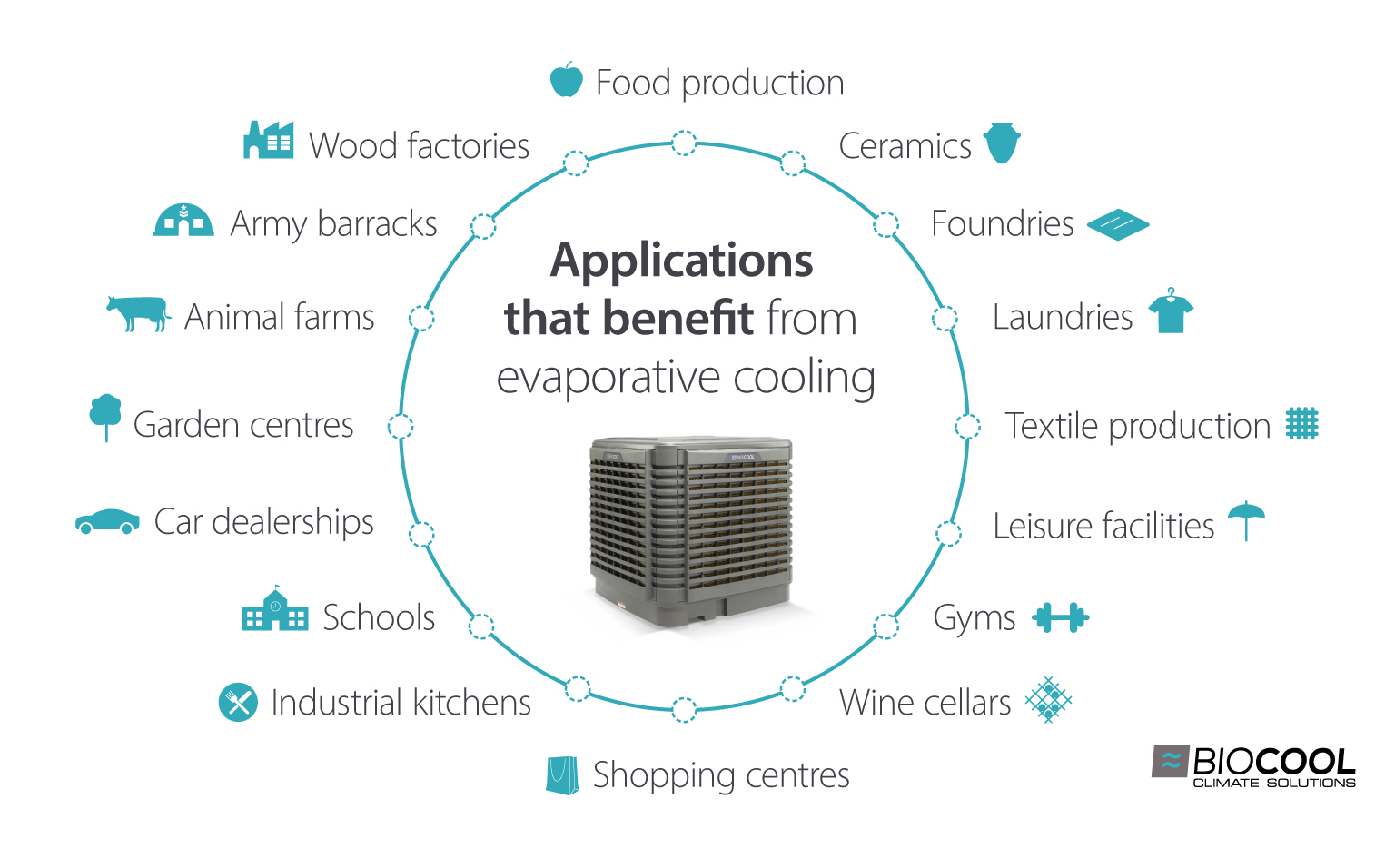
What climates and countries can benefit from evaporative cooling?
Evaporative cooling is efficient and effective in all climate settings. Even in the most humid countries in Europe, including the United Kingdom, Germany and The Netherlands, the climate conditions are perfectly suitable for this technology.
There is a misconception among many that evaporative coolers are only viable in hot, dry climates, such as the west coast of America, Saudi Arabia and Australia, and that their efficiency declines in more humid climates.
This has been a barrier to organisations in Europe reaping the advantages offered by evaporative cooling.
So, if you have been led to believe that this technique is not appropriate due to your region’s climate, think again – the truth is that evaporative cooling can be just as efficient and effective in these settings as it is in hotter, dryer landscapes.
Limitations of evaporative coolers
While evaporative coolers have many tangible advantages over other cooling systems, they aren’t ideal in every scenario.
As commercial swamp coolers rely on the outdoor temperature to work and exterior conditions are always in flux, these units can lack the precision of mechanical air-conditioning units.
Conventional A/C systems allow users to control the temperature in granular increments, ensuring the target temperature is achieved and maintained, so long as windows remain closed.
While most environments don’t require absolute precision, there are some instances where this may be key, such as pharmaceutical manufacture.
What size evaporative cooler will you need?
Now that we have discussed the advantages of evaporative coolers, how this technology compares to other cooling solutions, and where it’s best suited – how do you decide what size unit you need for your space?
When it comes to choosing an appropriate unit, there are 2 options.
Fixed evaporative coolers
Fixed evaporative coolers are larger units that can’t be moved. This size enables these units to provide enough air flow to cool significant spaces. Our BIO 30AV unit, for example, delivers an air flow of 30,000m3/h.
Portable evaporative coolers
Portable evaporative air coolers are the alternative option. While these solutions are unable to induct fresh air inside or cool larger spaces, the smaller footprint of these devices makes them highly manoeuvrable –ideal for regulating the temperature of smaller areas.
As well as being able to deliver cooling to a 400m2 area, our portable BC 341 can do so efficiently and quietly.
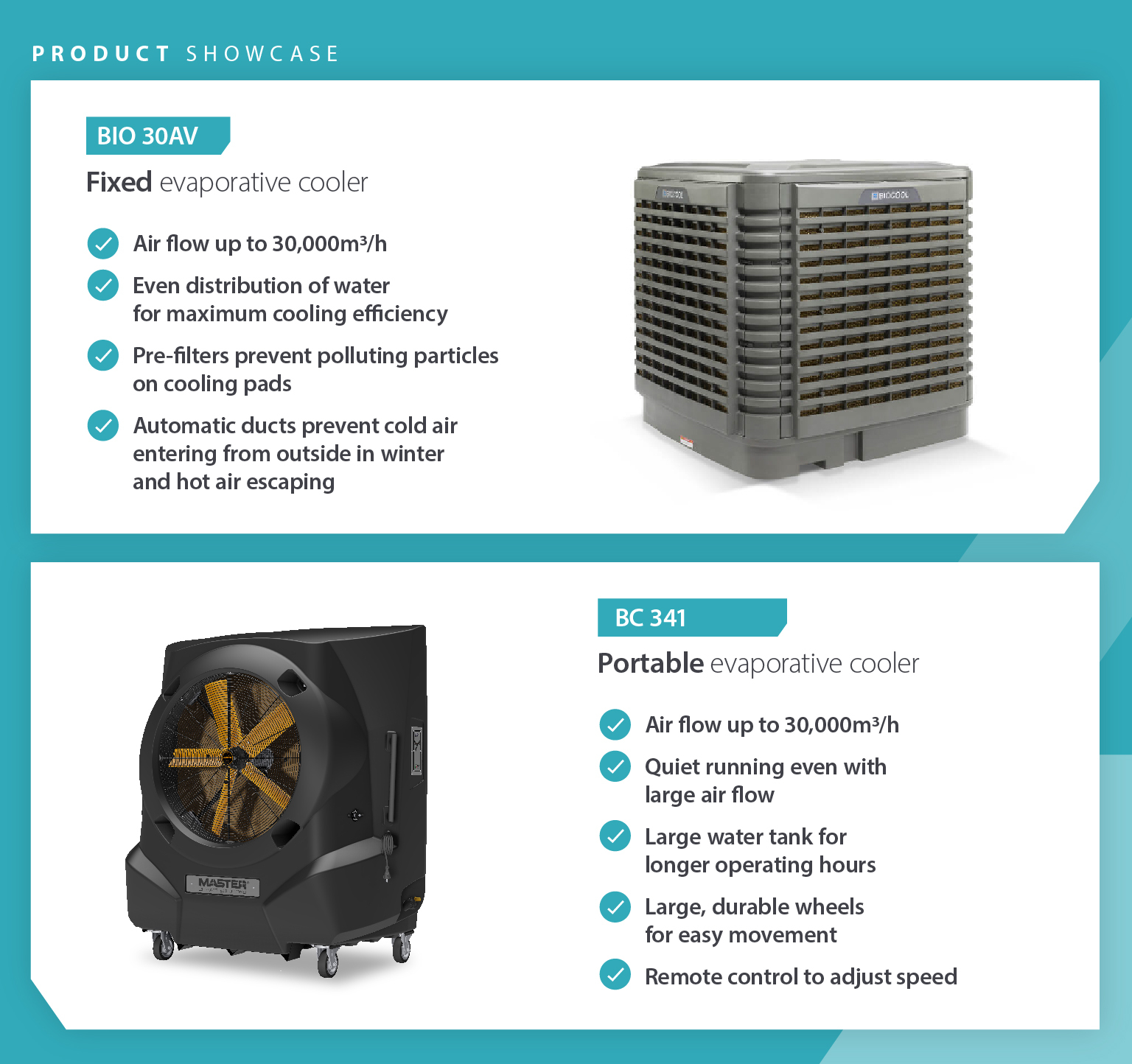
So are evaporative coolers actually effective?
Although organisations have long relied on traditional air-conditioning units for their cooling needs, these mechanical solutions aren’t always the ideal solution.
In many cases, evaporative coolers are the most effective choice as they can economically cool a wider area and work in a greater variety of spaces. Crucially, this technology is highly energy-efficient, reducing the amount of power used and the cost of operation.
Furthermore, because water vapour is the only byproduct of this technology, evaporative solutions are also truly eco-friendly.
Why choose Biocool?
If your organisation wants an effective, efficient and low-cost cooling solution, Biocool is a leading name in the world of climate control. We utilise the very latest technology to deliver unrivalled reliability, sustainability, efficiency and usability in all of our evaporative units.
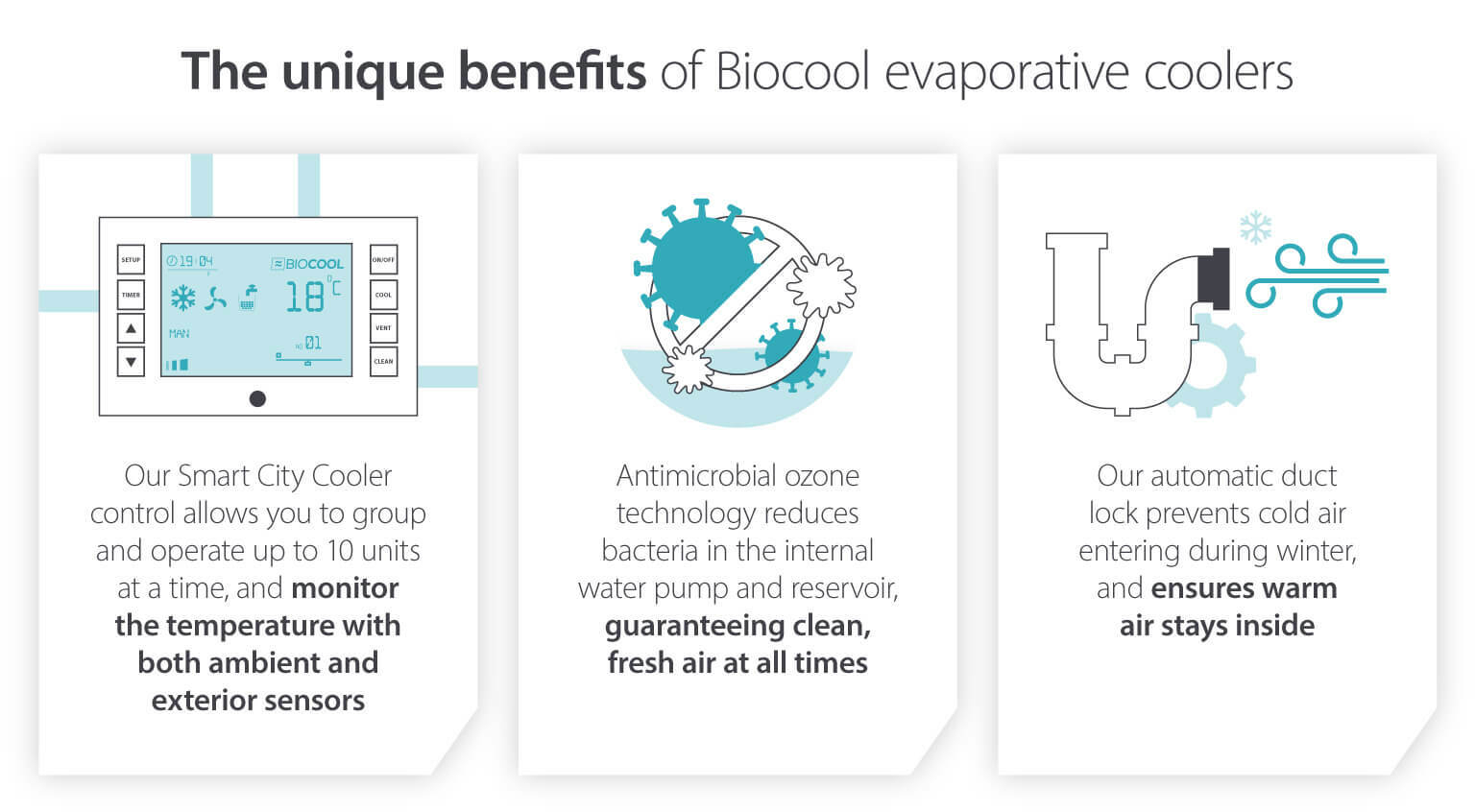
Biocool app
As we have discussed above, evaporative coolers rely on outdoor humidity and temperature to function effectively and economically. While this is an outstanding benefit, we understand it can be difficult to realise the impact one or more of these units may have in your region.
To demonstrate the real-world capabilities of our evaporative cooling technology, our Biocool App, available in English, Spanish and French, can simulate the potential cooling ability, as well as the energy savings you could be making, in your city and country.
If you would like to visualise the potential of our evaporative coolers, download our app on iOS and Android devices today. Although there is an app fee, we are able to offer free access for the next 6 months if you get in touch.
Find our range of evaporative coolers here. If you want to learn more about our products, and how they can enhance conditions indoors, feel free to get in touch or complete the form below.
Related products
Featured insights

Evaporative cooling is key for climate control now and in the future.

Evaporative coolers reduce energy consumption by up to 90% – are they better than air-conditioners?
Need help with choosing the right solution? Our team of over 100 climate control experts can assist.
You can also reach out or join the discussion on our Social Media. Check out our LinkedIn page.
